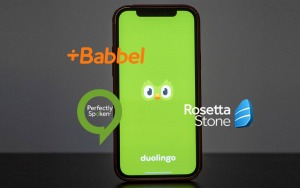In today’s interconnected world, learning a new language, such as English, has become increasingly vital. With the advent of online learning platforms, students now have access to a wide range of tools and resources to aid their language learning journey.
Before making a final decision it’s important to examine the effectiveness of Duolingo as a language learning platform and look at the best alternatives.
Duolingo has gained significant popularity as a language learning app due to its user-friendly interface and gamified approach. It offers bite-sized lessons, interactive exercises, and a fun learning experience. However, whether or not Duolingo is the best way to learn a language depends on various factors and individual preferences.
Duolingo’s advantages include its accessibility, affordability (with a free option available), and its ability to provide a basic foundation in vocabulary and grammar. It is particularly useful for beginners or individuals looking for a casual introduction to a new language.
However, Duolingo has some limitations when it comes to developing more advanced language skills. The platform’s focus on gamification and limited opportunities for live conversation practice can hinder the development of fluency and nuanced language understanding.
While Duolingo is a popular language learning app, there are other excellent alternatives available for English language learners. Some of the best alternatives include:
Rosetta Stone: Known for its immersive language learning approach, Rosetta Stone provides comprehensive courses that focus on all aspects of language acquisition, including speaking, listening, reading, and writing.
However, it is argued that its content tends to prioritize vocabulary and sentence structure over practical conversational skills and students may have limited ability to understand and communicate effectively in real-life situations.
Babbel: Babbel offers a wide range of interactive lessons designed by language experts. The app provides real-life dialogues, grammar exercises, and vocabulary building exercises to help learners develop practical language skills.
Language experts argue that Babbel’s main limitation is its focus on vocabulary and basic grammar without offering extensive practice in speaking and listening skills which will limit its attraction for students who want to develop fluency and engage in real-life conversations.


Perfectly Spoken: Combining Self-Study and Live Practice
Perfectly Spoken is becoming an increasingly popular choice for English language learners, especially for those seeking a more comprehensive and immersive language learning experience. It offers a combination of self-study materials and live practice with expert teachers, providing a well-rounded approach to language acquisition.
Self-Study Materials cover various aspects of language learning, such as grammar, pronunciation, listening skills, and vocabulary expansion. The structured curriculum ensures systematic progress through different levels of difficulty, enabling learners to develop a solid foundation in the English language.
Live Practice with Expert Teachers: Experienced native teachers offer live online classes which allow learners to practice their speaking and listening skills in a supportive environment including engaging conversation practice where learners can enhance their fluency, pronunciation, and overall language proficiency. The combination of self-study and live practice ensures a holistic learning experience that addresses both individual study needs and the importance of real-life communication skills.
Duolingo provides a convenient and accessible platform for language learning – and for learning many different languages. However, when looking specifically at English language learning, its limitations in terms of developing advanced language skills and live conversation practice make it less suitable for those seeking a comprehensive language learning experience.
Other alternatives like Perfectly Spoken, on the other hand, offer self-study materials with live practice led by expert teachers. This delivers a more well-rounded approach to language acquisition. By utilizing a combination of self-study and live practice, learners can enhance their language skills and develop the fluency and confidence to interact in real-life situations.
